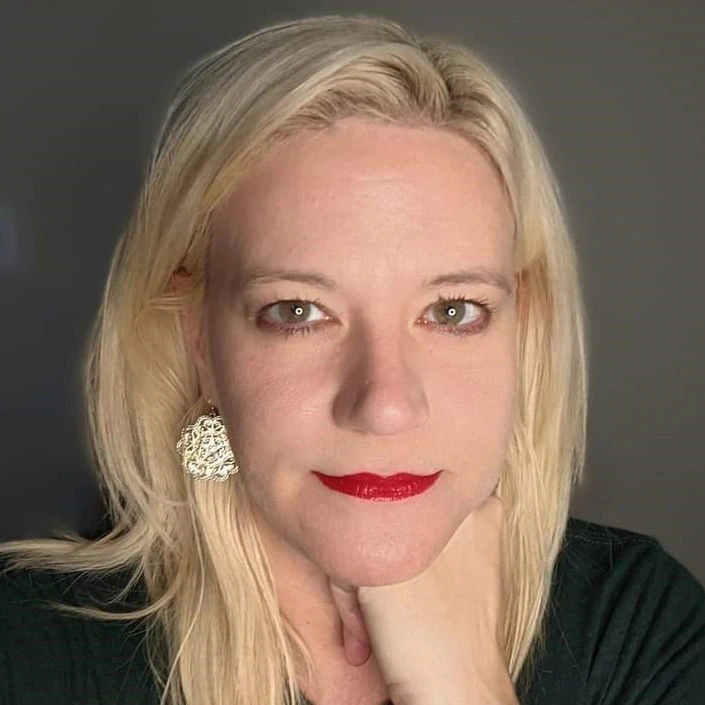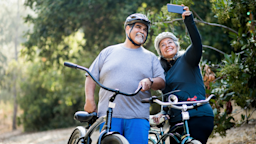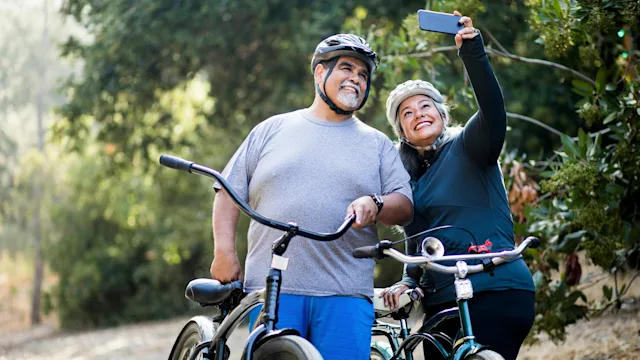Key takeaways:
Tevin Evans’ earliest memories include hurtful comments about his size.
It took years of diets and disordered eating before he learned that his weight didn’t determine his worth.
Today, Tevin is a model and influencer who uses his platform to promote body positivity.
Tevin Evans remembers the first time someone commented on his weight. He was 6 or 7 years old, at the pool, with his cousins. He didn’t want to take his shirt off after someone pointed at his chest.
Tevin has never forgotten that moment. He’s now 32.
Tevin’s whole life has been marked by cycles of gaining weight, losing it, maintaining it, and gaining it again. The Brooklyn-based model, stylist, actor, and influencer uses his social media platform to inspire others to love themselves.
“I’ve been heavyset my entire life,” he says. “And it’s kind of been a back-and-forth journey, and then also just like learning to love myself within that.”
Experimentation with eating disorders didn’t work
Tevin says his relationship with food became complicated in the seventh grade. He was bullied terribly because of his weight, and he started skipping meals. That continued into high school and led to purging.

Tevin’s high school dance teacher told him he couldn’t perform in the senior ensemble if he didn’t lose weight.
“It’s my senior year,” he remembers. “I’d worked so hard for this. I want to be a part of this, and now it’s slipping through my fingers because I’m so big. So I was just like, ‘OK, I’m gonna chew gum, drink water.’”
Tevin’s mom enrolled him in a weight-loss program for children who are significantly overweight. He and a cousin, who was also overweight, went together. He says a nutritionist helped him change his diet away from the Caribbean-style family meals his mother made. He ate yogurt and hummus instead of yams. His carbohydrates were severely restricted.
He lost weight but gained anxiety
Tevin lost weight, but his anxiety skyrocketed. He constantly worried about having to leave school once a week for weigh-ins. If he lost weight, he would be praised. If his weight stalled, he would be questioned. If he gained weight, he would be questioned even further. His weight became tied to his worth. And thinness seemed to be a virtue.
What does it mean to redefine obesity? It means that having a larger body does not necessarily mean someone is unhealthy.
Is the body mass index scale an accurate measure of health? Read why this woman doesn’t think so.
How do you face fatphobia? Find out why one woman says your body isn’t the problem.
So he continued to starve himself — until one day in dance class, when he fainted.

“I’m not the typical face of what people consider an eating disorder at all,” he says. “But those are things I experienced and I dealt with.”
In college, Tevin’s issues with food continued, especially after his mom was diagnosed with breast cancer. He turned to food when he needed emotional support. If he felt like crying, he went to the cafeteria. Chicken tenders, loaded fries, and red velvet ice cream gave him comfort.
Read more like this
Explore these related articles, suggested for readers like you.
“I would find myself just eating everything,” he says.
After 3 years in school, Tevin transferred to a different college and found a new group of friends. He auditioned for his college’s production of the Broadway musical “Rent” and got the solo to sing “Seasons of Love.” Something shifted in him.
It wasn’t an instant spark that spurred the change in how he saw himself. It was more of a gradual change. But it was change, nonetheless.
Finally, he found a platform for body positivity


These days, Tevin has a platform on social media where he posts about his style. He shares the places he buys clothes so other men his size can find outfits they feel comfortable in.
Tevin has been interviewed for magazines and booked in photo shoots. He began working as a stylist and finding himself in spaces where people his size don’t normally find themselves — especially as working models, he says. People didn’t just want to see his body in fashion but to hear his opinion. His social media presence blossomed.
Still, people online can be particularly cruel. His body has been called vulgar. He has been ignored by photographers during New York Fashion Week, ridiculed, and told that fat people should not be in public.
Yet Tevin remains outspoken and unapologetically authentic. He has improvements to make, he says, but is not interested in anyone else’s opinion. He no longer lives to please other people.
Being thin isn’t the only way to be healthy
Tevin says he’s learned that being thin isn’t the only way to be healthy. He has lost some weight and feels more comfortable in his clothes.
“Although I still have those struggles when I think about food … I think I’m more willing to identify it and talk about it when I get the feeling,” he says. “I call a friend and tell them, ‘Hey, this is how I’m feeling. This is what’s going on. Can you talk me through this moment?’”
He stays active, and he makes good food choices more often. He no longer starves himself, binges, or purges. A former trainer had him on a meal plan, but Tevin says he needs one that is more suitable to his lifestyle. He eats a lot of sushi with brown rice, avocado, and carrots. He’s working on moderation.
Tevin wants to lose more weight and build muscle, and he’s working toward consistency in his gym schedule. But just as important as what he looks like is how Tevin feels.
Tevin’s healthcare professional has said he could have bariatric surgery, but Tevin is concerned about potential side effects and complications that could come with it. His physician also said he could try a weight-loss medication like Ozempic. But rapid weight loss in Tevin’s face could reduce the levels of collagen and elasticity in his skin, which could dramatically change the way he looks. And his face is part of his livelihood.
Looking for balance rather than a number on the scale
After years of living a roller-coaster ride with his weight, Tevin simply wants balance.
“My body is my body,” he says. “And at the end of the day, I had to learn to love my body.”
Talk it out
Tevin has advice for those who live in bigger bodies and want to feel comfortable with who they are.
Tevin recommends talking to a therapist, a relative, or a friend. Or let your emotions out in a journal. Just don’t hold it in.
“If I can articulate what I’m feeling, then I can work through it,” he says.
Don’t shrink. Don’t hide. Take up space
“You have to be your No. 1 supporter,” Tevin says. “You have to gas yourself up. You’ve gotta look yourself in the mirror and say: ‘Damn, I’m sexy.’ You have to get dressed up for you, whatever that looks like. If you can’t find the things you want to wear, talk to people like myself to help you find it.”
Men, get creative in how you approach fashion
Tevin’s message about fashion is that it can be accessible, no matter your gender or your size.
“I tell people all the time, ‘OK, you want to wear a pair of skinny jeans, and they’re not in your size, look in the women’s department,” he says. “Because the plus-sized women’s department has a far larger range in styles than we do as men.”
Everyone has an opinion. You have to decide how you’ll respond
Tevin has chosen a response to his haters.
“I’m Black, and I’m fat, and I’m gay,” Tevin says. “That is a triple whammy. It’s a triple threat. I’ve told people that they’re projecting their insecurities on me and that their words have no place here because your insecurities are not mine.”
He doesn’t worry anymore about what other people think of him.
“If any part of me makes you feel uncomfortable, that is not my cross to bear because I am completely comfortable with myself,” he says.

Why trust our experts?





















